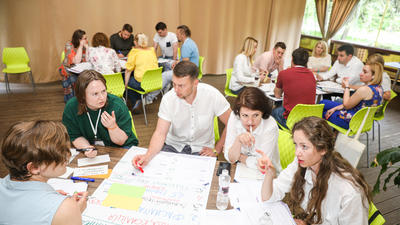-
Our work
-
Fields of work
- Arms control
- Border management
- Combating trafficking in human beings
- Conflict prevention and resolution
- Countering terrorism
- Cyber/ICT Security
- Democratization
- Economic activities
- Education
- Elections
- Environmental activities
- Gender equality
- Good governance
- Human rights
- Media freedom and development
- Migration
- National minority issues
- Policing
- Reform and co-operation in the security sector
- Roma and Sinti
- Rule of law
- Tolerance and non-discrimination
- Youth
- Field operations
- Projects
-
Meetings and conferences
- Summit meetings
- Review Conferences
- Ministerial Council meetings
- Plenary meetings of the Permanent Council
- Plenary Meetings of the Forum for Security Co-operation
- Security Review Conferences
- Annual Implementation Assessment Meetings
- Economic and Environmental Forum
- Economic and Environmental Dimension Implementation Meetings
- Human rights meetings
- Media conferences
- Cyber/ICT security conferences
- Conference of the Alliance against Trafficking in Persons
- Gender equality conferences
- Annual OSCE Mediterranean conferences
- Annual OSCE Asian conferences
- Partnerships
-
Fields of work
-
Countries
- All
-
Participating States
- Albania
- Andorra
- Armenia
- Austria
- Azerbaijan
- Belgium
- Belarus
- Bosnia and Herzegovina
- Bulgaria
- Canada
- Croatia
- Cyprus
- Czechia
- Denmark
- Estonia
- Finland
- France
- Georgia
- Germany
- Greece
- Holy See
- Hungary
- Iceland
- Ireland
- Italy
- Kazakhstan
- Kyrgyzstan
- Latvia
- Liechtenstein
- Lithuania
- Luxembourg
- Malta
- Moldova
- Monaco
- Mongolia
- Montenegro
- The Netherlands
- North Macedonia
- Norway
- Poland
- Portugal
- Romania
- Russian Federation
- San Marino
- Serbia
- Slovakia
- Slovenia
- Spain
- Sweden
- Switzerland – OSCE Chairpersonship 2026
- Tajikistan
- Türkiye
- Turkmenistan
- Ukraine
- United Kingdom
- United States of America
- Uzbekistan
- Asian Partners for Co-operation
- Mediterranean Partners for Co-operation
-
Structures and institutions
- Chairpersonship
-
Secretariat
- Secretary General
- Office of the Secretary General
- Conflict Prevention Centre
- Transnational Threats Department
- Office of the Special Representative and Co-ordinator for Combating Trafficking in Human Beings
- Office of the Co-ordinator of OSCE Economic and Environmental Activities
- Gender Issues Programme
- Opportunities for Youth
- Department of Human Resources
- Department of Management and Finance
- Office of Internal Oversight
- Documentation Centre in Prague
- Institutions
-
Field operations
- Presence in Albania
- Centre in Ashgabat
- Programme Office in Astana
- Programme Office in Bishkek
- Mission to Bosnia and Herzegovina
- Programme Office in Dushanbe
- Mission in Kosovo
- Mission to Moldova
- Mission to Montenegro
- Mission to Serbia
- Mission to Skopje
- Project Co-ordinator in Uzbekistan
- Closed field activities
- Parliamentary Assembly
- Court of Conciliation and Arbitration
- Organizational structure
- About us
News Item
Ukraine introduces OSCE-developed methodologies of conflict management in public service institutions
The OSCE Project Co-ordinator in Ukraine helped the National Agency of Ukraine for Civil Service to develop Methodology Recommendations on Conflict Management in State Institutions and another one elaborated for Local Self-Governance Bodies. On 20 June 2022, the two documents were approved by the Order of the Head of the Agency and are now distributed among authorities at all levels.

- Issued on:
- Issued by:
- OSCE Project Co-ordinator in Ukraine (closed)
- Fields of work:
- Conflict prevention and resolution, Good governance
The OSCE Project Co-ordinator in Ukraine helped the National Agency of Ukraine for Civil Service to develop Methodology Recommendations on Conflict Management in State Institutions and another one elaborated for Local Self-Governance Bodies. On 20 June 2022, the two documents were approved by the Order of the Head of the Agency and are now distributed among authorities at all levels.
The Recommendations provide step-by-step guidance and a number of practical tools on how to identify interpersonal conflicts among public servants, diagnose their types and analyze them, prepare for and carry out an intervention to tackle those conflicts. The documents also contain a set of advices on prevention of conflicts in the workplace.
Prior to this, in 2021 the Project Co-ordinator produced the Guidebook “Conflict Management for the Needs of Public Service”. It comprised a study of foreign experience in managing conflicts in state institutions, analysis of national legal documents and regulations in the considered area, results of research on the state of interpersonal conflicts conducted among public servants, theoretic background, practical tools and advices for managing conflicts in the public service. In addition, the publication provides a guidance on establishing a conflict management system in a public institution.
The Methodology Recommendations and the Guidebook will contribute to creating more harmonious and enabling environment for public servants so they can have more cohesive teams that cultivate the culture of dialogue, listening and accepting different points of view. In turn, this will facilitate more co-ordinated, efficient and quality work of state authorities and local self-government bodies.
The Guidebook “Conflict Management for the Needs of Public Service” is available here.
The Methodology Recommendations on Conflict Management in State Institutions are available here.
The Methodology Recommendations on Conflict Management in Local Self-Governance Bodies are available here.